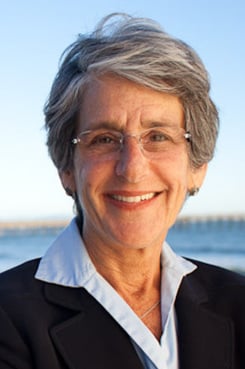Judiciary Chair Hannah-Beth Jackson Will 'Hold the Line' on Privacy in 2020
Termed-out lawmakers sometimes step down from their committee chairs during their final months in office, but Hannah-Beth Jackson said she expects to retain her Judiciary post until she leaves the Legislature. She speaks with The Recorder about privacy, the environment and worker protections in a wide-ranging Q&A.
January 28, 2020 at 01:07 PM
9 minute read
 State Sen. Hannah-Beth Jackson
State Sen. Hannah-Beth JacksonCalifornia state Senator Hannah-Beth Jackson may be in her last year in office, but the Santa Barbara Democrat hasn't pulled out the moving boxes just yet.
Entering her eighth year in the Senate, the chair of the Judiciary Committee is a key progressive player in shaping workplace, women's rights and privacy legislation. She wrote the law, now the target of litigation, requiring corporate boards to include women. And in a marathon 12-hour hearing last year, her committee fended off corporate- and tech-backed attempts to weaken the California Consumer Privacy Act.
While Jackson hasn't introduced her final bill package yet, her fans and critics can expect more of the same in 2020. Termed-out lawmakers sometimes step down from their committee chairs during their final months in office, but Jackson said she expects to retain her Judiciary post until she leaves the Legislature.
Jackson recently spoke with The Recorder about her plans for the next year and life after the Legislature. The conversation is edited for length and clarity.
The Recorder: What's coming from you in terms of legislation this year?
Jackson: What I want to do is close the circle on things that I have worked on in the past, to either improve them, or to get them passed.
And that's the way I look at this whole privacy issue. It's been a tough one because the powerful money forces of the technology world don't want any restrictions. They don't want any regulation. And I think that's frankly irresponsible and dangerous to our future.
These industries, they have a lot of money. And they come into my office, a dozen lobbyists. And there's one poor person here from the ACLU, if at all. And they are trying to persuade my colleagues that there's no harm in this or that we are then undermining technology and undermining its great opportunities. And I just don't agree with that.
So what are you going to do?
Hopefully I'm going to hold the line on whatever comes that tries to reduce the protections that we were able to hold in the last night of committee hearings last year, on definitions of what data is de-identified, what constitutes personal information. I'm sure those are coming. It's been a little bit complicated by [Alastair] Mactaggart's latest initiative.
 Alastair Mactaggart, San Francisco real estate developer. Photo Illustration: Jason Doiy/ALM
Alastair Mactaggart, San Francisco real estate developer. Photo Illustration: Jason Doiy/ALMHe's trying to go collect signatures [for his initiative]. I don't know if it qualifies or not, but I'm going to assume it will. And so, that creates another potential negotiation with all of the various monied factions from the data collection companies to our biggest companies.
Anything else on your plate?
We want to try to do some [California Environmental Quality Act] issues this year. The unique thing about CEQA is that it's in response to a publicly driven initiative to create this environmental protection. And the only recourse is litigation. And that's a time-consuming and often expensive process. I did some legislation on this, about four or five years ago to try to expedite the process because that's the biggest complaint we heard.
But we're going to look at something even a little bit more comprehensive this year that's still going to protect CEQA. But you know it's sort of gotten thrown under the bus of this housing problem.
And there are these mandatory arbitrations, You're given no choice. I have always been baffled that the notion that I read the Constitution is requiring the right of people to access the courts. But that isn't what we have, if you have mandatory and binding arbitrations, you don't access the courts, and I've done legislation and I may do a bill again this year that's going to do everything we can protect at least ensure the impartiality of those doing the arbitrations.
And what about the California Consumer Privacy Act?
This is its first year of enforcement. Personally I think we held the line last year. It aged me.
But we do have the CCPA, it's now effective. I'm a little concerned, frankly. I don't know if you've looked at any of these privacy policies. I'm an attorney, I practiced law for 22 years, and most of them are absolutely incomprehensible to me. Or they take 25 minutes. And I think they're designed frankly to frustrate the user.
That's something I would like to look at. And I think that'll be one of my focuses here. You know a right without remedy is no right at all. We can pass all the great laws we want. But if you can't enforce them, they're not worth the paper they're written on.
Have you requested any of your personal information under CCPA?
I have not. My theory is that as an elected official, I don't have any privacy. I probably would be horrified. But my assumption is that I have very little in my life that is within any kind of cone of privacy. And frankly when you run for public office, you just give up most of that.
Do you think these tech companies are just waiting until you leave the judiciary committee?
Well in my conversations with Alastair he claims that that is one of the reasons that he brought this [second] initiative, is that he didn't want to see all this fighting going on in years to come. I don't know if that's, part of me was very flattered, part of me thinks he's full of baloney.
I just worry because right now, the tech industry is the big 800-pound gorilla in the room. It used to be the oil industry. They're still pretty powerful, but the tech industry with all their money, with billions of dollars they've got offshore, with the fascination with which they're held by many of my colleagues, with the money that they have available to try to influence legislation and influence elections, they're,very powerful and they've become much more sophisticated,
They tried to get legislation routed around your committee last year.
Yes, some faux national charity organization, which was then exposed as being supported by lots of tech money. But my hope is that we continue to try to identify ways that technology can work while doing legitimate, appropriate regulation. That will not undermine innovation. That's their phrase, and I think that is just such hooey. We're just setting some parameters.
 California Gov. Gavin Newsom. Photo: David Paul Morris/Bloomberg
California Gov. Gavin Newsom. Photo: David Paul Morris/BloombergDo you think Gov. Gavin Newsom is going to have a different perception toward your efforts than Gov. Jerry Brown?
Well I think Gov. Newsom represents a different generation, a new era. I think Gov. Brown was the right person at the right time for what the state needed. But now it's 2020. And we have a governor who's got four little kids and a very strong wife who's not going to raise them alone. He's doing a lot on family leave, the whole issue of harassment in the workplace
And I want to do some legislation if at all possible to make sure we continue requiring companies to look in the mirror and are paying their workers fairly and equally for the work they do. On paid family leave, I've been working with the governor's office to try to extend job protection, because people won't take the leap if they think they're going to lose their job.
Will you be involved in the debate over medical malpractice caps?
It remains to be seen what this looks like. I do believe, and have since I was elected, that the cap on medical malpractice is just unduly low. And we know that in almost all professions, it's a small, small percentage of bad actors that commit the overwhelming amount of medical malpractice or legal malpractice. And I think it's important to root them out. I know there's talk about an initiative this year or legislation, and I'd like to see what it looks like first.
Have you thought about what the next chapter is for you?
Well, you know, I don't think I'm done. I just feel too passionately about issues and have too much energy. But, frankly, you know, this is an eight-day-a-week job. You come home Thursday afternoon and you're meeting with people, going to events Thursday through Sunday and then you come back here. I think I'm going to look forward to not quite as strenuous a lifestyle.
It's just more time for reflection. One of the problems with this job is there's not a lot of time to think. And you go from one meeting to another. And for me, I love to solve problems, and so I'm thinking, I mean I don't think I'll ever retire. I may want to sort of put out a shingle to do some consulting.
But you know I'd love to share my knowledge and experience. On the other hand, I feel as though I've been working about 55 years. I feel like I've done a pretty good job.
This content has been archived. It is available through our partners, LexisNexis® and Bloomberg Law.
To view this content, please continue to their sites.
Not a Lexis Subscriber?
Subscribe Now
Not a Bloomberg Law Subscriber?
Subscribe Now
NOT FOR REPRINT
© 2025 ALM Global, LLC, All Rights Reserved. Request academic re-use from www.copyright.com. All other uses, submit a request to [email protected]. For more information visit Asset & Logo Licensing.
You Might Like
View All

Fresh lawsuit hits Oregon city at the heart of Supreme Court ruling on homeless encampments
4 minute read

Trending Stories
- 1Uber Files RICO Suit Against Plaintiff-Side Firms Alleging Fraudulent Injury Claims
- 2The Law Firm Disrupted: Scrutinizing the Elephant More Than the Mouse
- 3Inherent Diminished Value Damages Unavailable to 3rd-Party Claimants, Court Says
- 4Pa. Defense Firm Sued by Client Over Ex-Eagles Player's $43.5M Med Mal Win
- 5Losses Mount at Morris Manning, but Departing Ex-Chair Stays Bullish About His Old Firm's Future
Who Got The Work
J. Brugh Lower of Gibbons has entered an appearance for industrial equipment supplier Devco Corporation in a pending trademark infringement lawsuit. The suit, accusing the defendant of selling knock-off Graco products, was filed Dec. 18 in New Jersey District Court by Rivkin Radler on behalf of Graco Inc. and Graco Minnesota. The case, assigned to U.S. District Judge Zahid N. Quraishi, is 3:24-cv-11294, Graco Inc. et al v. Devco Corporation.
Who Got The Work
Rebecca Maller-Stein and Kent A. Yalowitz of Arnold & Porter Kaye Scholer have entered their appearances for Hanaco Venture Capital and its executives, Lior Prosor and David Frankel, in a pending securities lawsuit. The action, filed on Dec. 24 in New York Southern District Court by Zell, Aron & Co. on behalf of Goldeneye Advisors, accuses the defendants of negligently and fraudulently managing the plaintiff's $1 million investment. The case, assigned to U.S. District Judge Vernon S. Broderick, is 1:24-cv-09918, Goldeneye Advisors, LLC v. Hanaco Venture Capital, Ltd. et al.
Who Got The Work
Attorneys from A&O Shearman has stepped in as defense counsel for Toronto-Dominion Bank and other defendants in a pending securities class action. The suit, filed Dec. 11 in New York Southern District Court by Bleichmar Fonti & Auld, accuses the defendants of concealing the bank's 'pervasive' deficiencies in regards to its compliance with the Bank Secrecy Act and the quality of its anti-money laundering controls. The case, assigned to U.S. District Judge Arun Subramanian, is 1:24-cv-09445, Gonzalez v. The Toronto-Dominion Bank et al.
Who Got The Work
Crown Castle International, a Pennsylvania company providing shared communications infrastructure, has turned to Luke D. Wolf of Gordon Rees Scully Mansukhani to fend off a pending breach-of-contract lawsuit. The court action, filed Nov. 25 in Michigan Eastern District Court by Hooper Hathaway PC on behalf of The Town Residences LLC, accuses Crown Castle of failing to transfer approximately $30,000 in utility payments from T-Mobile in breach of a roof-top lease and assignment agreement. The case, assigned to U.S. District Judge Susan K. Declercq, is 2:24-cv-13131, The Town Residences LLC v. T-Mobile US, Inc. et al.
Who Got The Work
Wilfred P. Coronato and Daniel M. Schwartz of McCarter & English have stepped in as defense counsel to Electrolux Home Products Inc. in a pending product liability lawsuit. The court action, filed Nov. 26 in New York Eastern District Court by Poulos Lopiccolo PC and Nagel Rice LLP on behalf of David Stern, alleges that the defendant's refrigerators’ drawers and shelving repeatedly break and fall apart within months after purchase. The case, assigned to U.S. District Judge Joan M. Azrack, is 2:24-cv-08204, Stern v. Electrolux Home Products, Inc.
Featured Firms
Law Offices of Gary Martin Hays & Associates, P.C.
(470) 294-1674
Law Offices of Mark E. Salomone
(857) 444-6468
Smith & Hassler
(713) 739-1250






